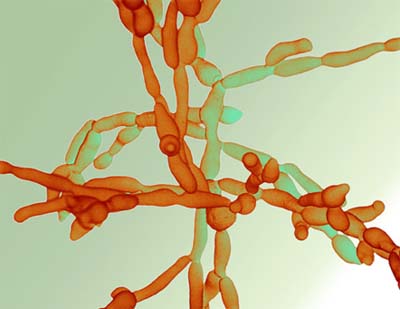Jan 25, 2026
Jan 25, 2026
 Candida albicans is a yeast-like fungus that lives in the mouth and throat, the intestinal tract and the genital tract. Normally, the population of candida is in healthy balance with other intestinal flora. However, sometimes its population explodes because of various factors such as an improper diet, bursts of intense stress or ongoing low-grade stress that isn't managed effectively combined with poor sleep/exercise routines or antibiotics or oral contraceptives - any dietary or lifestyle imbalances that compromise natural immunity can result in the yeast bacteria getting out of control and escaping the bounds of its normal abodes to other parts of the body.
Candida albicans is a yeast-like fungus that lives in the mouth and throat, the intestinal tract and the genital tract. Normally, the population of candida is in healthy balance with other intestinal flora. However, sometimes its population explodes because of various factors such as an improper diet, bursts of intense stress or ongoing low-grade stress that isn't managed effectively combined with poor sleep/exercise routines or antibiotics or oral contraceptives - any dietary or lifestyle imbalances that compromise natural immunity can result in the yeast bacteria getting out of control and escaping the bounds of its normal abodes to other parts of the body.
An out-of-control population of the yeast bacteria has been linked to a multitude of seemingly unrelated symptoms, including abdominal bloating and gas, coated tongue, nausea, fatigue, respiratory system imbalance, frequent UTI, genital area infections, skin problems, spaciness and inability to focus and emotional imbalance. If left uncorrected, the different systems of the body become sluggish and ama-clogged, creating an even more favorable environment for the growth of the yeast fungi and setting up a vicious cycle of poor health.
Ayurvedic healers recommend a holistic approach to restoring balance that includes diet, lifestyle recommendations and herbs and spices. It takes patience, discipline and a full commitment to one's health to restore balance and stay in balance, but the results are well worth the effort.
If you are pregnant or lactating, or experiencing mental, emotional or physical symptoms, it is best to consult a physician who can recommend an individual program for balance after an assessment. Here are some suggestions for restoring balance:
Dietary Dos and Don'ts
First, what you should stay away from:
Avoid sweet, heavy, cold foods. Sugars create an environment that facilitates the growth of yeast bacteria. Sweet, heavy, cold foods overtax an already weakened digestive system and create mote internal toxins. Fruit juices and very sweet fruits such as grapes should also be avoided.
Avoid leftovers. Even if refrigerated, leftovers are conducive to growth of mold and bacteria, and they are harder to digest than fresh foods, prepared fresh and eaten immediately.
Avoid caffeine, nicotine, alcohol and carbonated beverages.
Avoid processed and junk foods and refined flours. Reduce white rice.
Avoid yeasted breads and pastas, aged cheeses, mushrooms and peanuts.
Avoid fermented foods such as vinegar and products that contain fermented foods as ingredients.
Guidelines for what you should include in your daily diet
One final word on diet. Ayurvedic healers recommend really paying attention to what specific foods do for your body and making dietary choices that help the most for you as an individual. A wide variety of healthy food choices is available and you can pick the ones that you enjoy and that work for your physiology. Keeping a food journal may be helpful, to help track what you are eating and to hone in on the foods that work the best for you. To stick to healthy eating patterns, your diet has to be enjoyable and appealing.
Lifestyle
Deep breathing: Breathing shallow reduces the quantity of life-supporting prana you receive with each breath. Practice deep breathing consciously until it becomes a habit.
Sleep
It is important to get an adequate amount of good-quality sleep each night to replenish energy levels and to give the self-defense mechanisms of the body the opportunity to purify the system. Make it a habit to go to bed before 10 p.m. and rise early.
Exercise
Exercise moderately everyday, choosing types of exercise that are appropriate for your body-type and needs for balance. Exercise in the mornings, and in the fresh air outdoors when you can.
Massage
A daily warm oil self-massage can help support energy levels, promote ease of falling asleep, support the health of muscles and joints, help release toxins from the deeper layers of the body for elimination, and support mental and emotional balance.
Stress Management
 Stress compromises your immune system. Practicing relaxing yoga postures, meditation and rest-and-recharge time can help you mange stress so that it does not become disruptive. Seek help if you think support would be helpful in order to manage stress.
Stress compromises your immune system. Practicing relaxing yoga postures, meditation and rest-and-recharge time can help you mange stress so that it does not become disruptive. Seek help if you think support would be helpful in order to manage stress.
Hygiene and Topical Help
Cleanse regularly but do not over-cleanse, which can irritate the skin. Use natural gentle cleansers, fragrance-free if you are sensitive even to natural essential oils or floral waters. 100% pure aloe and pure organic coconut oil may help provide soothing topical comfort. Coconut oil has antibacterial properties as well. Keep skin dry and aired as much as possible. Wear organic cotton clothing and sleep on cotton bed linens.
Cleansing
Ayurvedic healers recommend a 45-day period of internal cleansing with every change of seasons to help get rid of accumulated ama (toxins).
Herbal Rasayanas for Support
Amalaki Rasayana helps enhance digestion, helps support natural energy levels, helps support the sinuses and the respiratory system and the health of the genito-urinary tract and is a rich source of Vitamin C that helps create an acidic environment that inhibits the growth of the yeast bacteria. Take 2 tablets twice a day with warm water or as directed by your ayurvedic physician.
Triphala Rasayana is a digestive toner and helps regularity without being harsh or habit-forming. 2-3 tablets of Triphala can be taken about an hour before bed during the 45-day internal cleansing period and one tablet once or twice a day all through the year as maintenance support.
Trikatu is a blend of dried ginger, long pepper and pepper that helps enhance digestion and facilitates the cleansing of toxins from the physiology. Take in combination with the Amalaki Rasayana to counter any heating of the body.
Neem Rasayana is a renowned ayurvedic antibacterial and antifungal. Take Neem in conjunction with pure aloe or Amalaki for balanced support.
Ashwagandha Rasayana helps support your physiology in managing stress, helps promote good sleep and helps support natural energy levels.
Disclaimer:
Information provided in this article is for the sole purpose of imparting education on Ayurveda and is not intended to diagnose, treat, cure or prevent any disease. If you have a medical condition, please consult your physician.
20-Feb-2005
More by : Shreelata Suresh